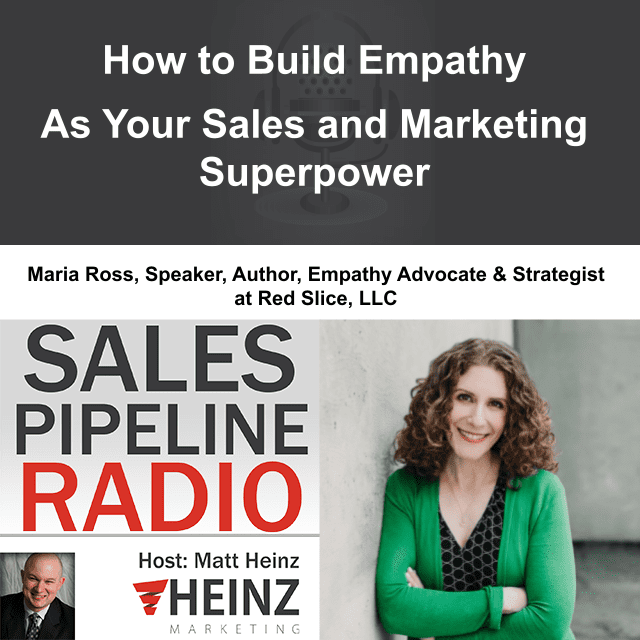Sales Pipeline Radio, Episode 331 Q & A with Maria Ross @redslice

By Matt Heinz, President of Heinz Marketing
If you’re not already subscribed to Sales Pipeline Radio or listening live every Thursday at 11:30 a.m Pacific on LinkedIn (also on demand) you can find the transcription and recording here on the blog every Monday morning. The show is less than 30 minutes, fast-paced and full of actionable advice, best practices and more for B2B sales & marketing professionals.
We cover a wide range of topics, with a focus on sales development and inside sales priorities. You can subscribe right at Sales Pipeline Radio and/or listen to full recordings of past shows everywhere you listen to podcasts! Spotify, iTunes, Blubrry, Google Play, iHeartRADIO, Stitcher and now on Amazon music. You can even ask Siri, Alexa and Google!
This week’s show is entitled, “How to Build Empathy As Your Sales and Marketing Superpower” and my guest is Maria Ross, Speaker, Author, Empathy Advocate and Strategist at Red Slice, LLC.
Tune in to hear more about:
- What is empathy and how it’s different from sympathy
- The role of empathy in sales and marketing
- Myths around empathy
- Research around how and why empathy is so important
Listen in now for this and MORE, watch the video or read the transcript below:
Matt: Welcome everyone to our first 2023 episode of Sales Pipeline Radio. I am so excited to have you all with us. I am your host, Matt Heinz. And boy, I don’t know where we are in the number of episodes. I think we’re somewhere maybe in like 300 or so. I should totally know this, but I’m really excited. Many of you have joined us here in the middle of your workday. If you are like me, most days this week it felt like Monday, so I’m looking forward to some non-Mondays as we get into next week. If you are watching and listening in the middle of your workday on LinkedIn Live, thank you very much for joining us. You can be part of the show. That’s the advantage of joining us live, if you have a question or a comment for our featured guest today, Maria Ross. We’re going to be talking about The Empathy Edge. We’re going to be talking about the role of empathy in sales and marketing, some myths around empathy, and some research around how and why it’s so important. Boy, I could go for much longer than 20 minutes on this, but very excited to have this topic today.
If you have a question or comment, put that into the LinkedIn comments, we’ll be able to see those. We can feature you in the show, ask your question live, et cetera, and thank you for that. If you are watching or listening on demand, thank you so much for downloading, for subscribing, for watching. If you like what you see here, for better or worse, this is what we do in almost every episode of Sales Pipeline Radio. So, every episode, past, present, and future, is always available at salespipelineradio.com, and thank you very much for checking that out as well.
All right, we are going to get right into it. Maria Ross, a friend, an expert in many things sales and marketing, and the author of the new book, The Empathy Edge. So excited to have you here today. And as we record this, you’re in Northern California, the bomb cyclone is making its way through, so clearly you have power, you have internet connection, Pavlovian, the bottom of the pyramid, I don’t know what you have, food, shelter, internet.
Maria: Completely, yes. Let’s just pray to the technology gods that we don’t cut out like I did in the middle of a Zoom call yesterday.
Matt: Oh, boy. No, we’re already poking the bear by even mentioning this, so I guess it’s all going to be fine. Well, I appreciate you being here and making this party, I know this is a busy season for you especially, because you do a lot of speaking, and you especially do a lot of sales kickoff meetings. So this month and next month, the next quarter, is particularly heavy SKO season.
You’ve covered a lot of topics in the time that I’ve known you, and your writing, your videos, I’ve learned so much from you. And empathy, this topic of empathy is really important to me as a way of leaning in and creating real connections with people. Talk about why empathy and how The Empathy Edge became a new topic for you, and why you decided to write your next book on it.
Maria: Well, I love this question because I actually am pivoting my business into focusing full-time on empathy. As you know, I have been a brand strategist for many years, and so much of that work is about cultivating empathy, so that you can connect and engage your ideal audience. So when you’re building brand messaging, when you’re building that brand story, it’s not just about features and functions, it’s about remembering that you’re speaking to human beings, even if it’s a B2B sale. That was always the thing that drove me crazy when I was on the client side, was we’re not speaking to robots. We’re speaking to human beings, and it doesn’t matter whether they’re spending money out of their own wallet or their company’s money. They are making a decision based on emotions. They might tell themselves they’re making it based on logic, but science has shown enough data around the fact that we often make decisions based on emotion, and use logic to justify that decision.
Yeah, so I obviously have been working around that, dancing around that topic of empathy for many years, and then just really decided around the time, 2016, 2017, with all the really bad leadership that was getting a lot of press, as I was trying to raise, at the time, a two and a half year old son and teach him about sharing and collaboration and empathy, I really got down, because I thought, “Why am I bothering to teach my son these skills, if the successful people around him, that he’s going to see in the world, don’t exhibit any of them?”
And so I embarked on a journey to research empathy as a competitive advantage for leaders, for cultures, for brands, and was delighted to find that the research proves that empathy is not just good for society. It is great for business.
Matt: I love it. I want to get deeper into a few of those different topics. I think empathy has been a tool and an advantage for many companies for a long time. I feel like if anything, the pandemic accentuated that, because we were forced to work from our basements with cats and kids and other things sort of coming across, and it was exhibiting that human side of things. And I want to address the identity relevance of empathy here as well. But let’s take a step back first, because I’m not sure everyone would necessarily, may not define empathy the same way. To you, what is empathy?
Maria: Empathy? There are a lot of definitions, and the definition has actually changed over time. So way back in the 1700s, the word sympathy actually meant what today we consider empathy. And that is really about being able to see, feel, and understand another person’s point of view or perspective. That’s really where, when I’m talking about empathy at work or empathy in the workplace, that’s what we’re talking about.
And moreover, taking that information, using it as a method of information gathering if you will, to understand where someone’s coming from and their context. And then using that information to take action, whether that action is to continue down the path you were doing, making a difficult business decision, but doing it in a way that is compassionate, communicating it in a different way. It could be changing your course of action, it could be coming up with a third option, but empathy’s kind of a useless emotion. It’s a useless construct if we don’t do anything with the information that we’re getting from other people.
Now, for a long time we’ve talked about empathy as walking in someone else’s shoes, and that’s starting to lose favor, because we can’t actually walk in someone else’s shoes. We have too much of our own bias and our own experience that colors that perspective.
What we can do is we can walk beside people, we can listen, we can connect with them emotionally, even if we haven’t had that same experience, it could evoke a similar experience that has evoked a similar emotion. And so again, when we’re talking about empathy, it’s about being able to see and understand another person’s point of view, and use that information to move forward together.
Matt: Can you differentiate empathy and sympathy? Because I think those are things that they think are the same thing, but they’re very different. Can you help define those for us?
Maria: Yeah, and I’m glad you asked that because I think that that holds a lot of leaders back of, “Oh, I don’t want to be seen as sympathetic, and I’ll be seen as weak.” That is not what empathy is. You can make a really tough business decision and do it in an empathetic way.
So sympathy is really about, almost about, there’s a tinge of pity involved in sympathy, and it’s distancing yourself from another person. Like, “Ooh, I feel really sorry for you, over there. On the other side. That’s not me.” Right? Empathy is actually standing with someone in their pain, in their joy, in their confusion, and just being a witness to that, and being able to connect with that person emotionally through that process.
And I do not know if you’ve ever seen Brené Brown. There’s a great illustrated video, animated video that was done to one of her talks, where she talks about the fact that sympathy is someone falls down a well, and you’re at the top of the well, and you’re going, “Gee, wow, I feel really sorry for you for falling down at the bottom of that well. That must suck.” Empathy is climbing down into the well, and sitting next to them, and being with them. And so what I like to talk about a lot is the myths of empathy, which is that it’s not about being nice. You can have a lot of nice people, but they may not understand someone else’s point of view.
It’s not about caving into crazy demands, which is another thing that holds leaders and salespeople back from exhibiting empathy. Just because you understand someone’s point of view, it doesn’t mean you do what they want.
And then empathy is also not about agreeing with someone. You can be empathetic and have a constructive conversation, and actually still hold your own points of view and perspectives, but you have a better understanding of where the other person is coming from.
Matt: Yes. I love that. We’re talking today on Sales Pipeline Ready with Maria Ross, longtime speaker, author, workshop facilitator, author of the new book, The Empathy Edge, and available for SKOs, although this isn’t a pitch, but for a limited time, because I know you’re already getting pretty booked up for this season.
This topic is so, so important for sales teams. It’s one thing to talk about sales process and methodology, but it’s another if you can teach your sales team how to ask the right questions, and be empathetic.
Brent Adamson, who was at Gartner and CTB, talks about the three reasons people make decisions. And there’s a professional and there’s a personal reason. Professional meaning, “What’s in it for the company?” Personal meaning, “What’s in it for me and my career?” But he says there’s also an identity piece to many business decisions, “What does this decision say about me? How does this decision reflect who I am?” And I think there’s very much an empathy-based ripple to that framing, of how to make a case for someone to change, to do something, to go through the pain of change, to do something different.
Maria: Right, and I love that you said that, because especially when I have been doing my brand strategy work and brand story work, that’s part of it. It’s trying to understand that person’s fears, values, emotions, goals, and speaking to that. And it could be just, “What does making this decision say about me?” And even working with my most complex tech clients, where very, very left brain logical leaders, it’s getting them to understand that it’s not just about widgets, it’s not about features and functions. We actually, again, have to speak to them as human beings if we want to create change, if we want them to take action.
Matt: Now, you very quickly referenced some research earlier as we got started, let’s unpack that. What evidence exists that empathy is important and that it works?
Maria: Yes. So there was a study done many years ago now. It was a study done, and it was featured in Harvard Business Review with USC, where they found that the most successful salespeople were not necessarily high in technical knowledge or business acumen. The traits that predicted success for salespeople were empathy, combined with ambition. They call it ego something, but really what they mean by that is ambition.
And when we talk about empathy, I would love to just read you this quote, because this is so powerful from this study. “This is the salesperson with good empathy. She senses the reactions of the customer and is able to adjust to those reactions.”
They are sitting with them, right in the well. They’re not simply bound by a prepared sales track, but they function in terms of the real interaction between themselves and the customer, sensing what the customer’s feeling, able to change pace, double back on the track, and make whatever creative modifications might be necessary to hone in on the target and close the sale.
Now, that might sound a little manipulative, but the point being, yes, and coming from marketing and supporting sales teams for a long time, enterprise sales teams, yes, there’s a pitch deck. Yes, there’s messaging. Yes, we want to be consistent and clear in our message, but when you’re in that moment in that sales conversation, it’s being able to actively listen.
And so many times I’ve been the recipient of sales meetings where they’re not even listening to me. They’re not even asking me what I want to know, or what my problem is. They are bound and determined to go through their demo, and their deck, and even to the point of, “Well, I’m not going to address that right now. Let me show you this thing for the next half hour, before I get to what you actually care about.” And those salespeople are never successful.
Matt: No. And you mentioned the idea that to some this may sound like manipulation. It sounds like this is really more discovery. This is really more sort of, you are not telling someone what they should think. You’re discovering what they think and how they operate today, and tying that to a decision or outcome. And you’re not going to unnaturally do that, I don’t think, and do that successfully. Which leads me to my next question. What do people get wrong about empathy? What are some of the myths about empathy, which push people in the wrong direction, sort of intentionally or unintentionally?
Maria: Yeah, and we touched on a few of those earlier, that empathy means, “If I’m really nice, I’m being empathetic.” No, that just means you bake really good cookies and you bring them to the office. It doesn’t mean you understand my point of view. And also the idea that I have to agree with someone in order to be empathetic.
There’s a gentleman named Edwin Rutsch out of Northern California. He runs an organization called The Center for Building a Culture of Empathy. He trains people all over the world on a technique called empathy circles, which I will describe as a very painful isolation of your active listening muscle. And he’s done these empathy circles at the most divisive political rallies we’ve had in our country, over the last few years in the US. And he’s been able to get people from completely opposite sides of the political spectrum in a tent, to listen to each other. And the intent is not to convert. We do not have to walk away from every conversation, except maybe a sale one, to convert. But they walk away at least understanding each other better, and understanding their shared humanity, and understanding why the other person has the perspective they have. Now, if you put that in a sales context, so many salespeople unfortunately go in with a prescription looking for the ailment, versus, “Let me listen to this prospect. Let me ask and echo back what they are saying to me. Let me reflect on what they are saying, before I launch into my prescription. And this person will now feel seen, heard, and valued. They will feel like I understand them, and I am the voice in their head.” That’s actually the key to effective marketing too, is asking and echoing back.
Instead of, this is the message I want to communicate to you, it’s, “Tell me in your words how you describe this problem, or the benefit that you seek.” And I’m going to use that in my sales copy. I’m going to use that on my webpage. And then when they get there, they’re going to go, “Wow, this company’s inside my head. They totally understand me.”
So, I think that that’s some of the big things. And especially the biggest myth, Matt, is that, and I think you know this, because I would say, and this is not just because I’m on your show, I would say you are a very empathetic leader.
Empathy is often seen as a weakness. Like, “Oh, if I’m empathetic and I’m going to show vulnerability, everyone’s going to take advantage of me, my ex, my boss, my team. It actually takes tremendous strength to be empathetic, because it takes tremendous self-confidence to listen to another person’s point of view without getting defensive.
You can tell an ego-driven, weak, insecure leader, if they shut other people’s ideas down. That is not strength. That is actually cowardice. So, I think this notion of, “Well, empathy means I’m weak.” Empathy, if you’re able to be empathetic, you’re actually incredibly strong and have a good presence of mind, and good self-esteem, where you’re like, “Okay, I can look at another point of view without seeing it as an attack.”
Matt: I love that you said that. I do think a lot of people are afraid sometimes of sharing how they really feel, or afraid of exhibiting some empathy. Some people just don’t want to open themselves up to others that way, and that is completely fine.
But look, I have got a whole list of blog post topics and other things that get deep into things that are a little vulnerable, that I’m nervous about communicating. And sometimes I say, “Well, let me stress test those in one-on-one conversations with people from my audience, and see how people respond to that. And usually you’ll find people say like, “Wow, no one ever talks about that.” No one is willing to bring those topics up, but they exist and they’re real. And if it’s a persistent thing amongst your customer base, amongst your prospects and your market, wouldn’t you like to be the brand? Wouldn’t you like to be the sales professional? Wouldn’t you like to be the expert who actually is willing to have that conversation?
Maria: “Let’s get real and talk about this.” Yes, exactly.
Matt: Exactly. So most of our conversation, we just got a few minutes left here today with Maria Ross, if you want to learn more about, I mean highly encourage everyone to get a copy of the book, The Empathy Edge. You can learn more at theempathyedge.com. Learn more about the book, learn more about Maria, hire Maria for your workshops and sales kickoffs.
Maria: Listen to the podcast.
Matt: Listen to the podcast. It is all the things. I just wonder, if we’ve been talking mostly about the sales impact of empathy. We got a lot of marketers listening to this as well. If I’m marketing, starting off the new year, how do I incorporate empathy more effectively into my marketing?
Maria: Oh my gosh, I love this, because I actually am launching a five-week course in March about how to create a more empathetic brand and empathetic marketing message. And this is where I live.
But I think the first thing you can do is make sure you are getting in front of customers. You can get all the information from your boss about personas. You can look at all these things. Get proactive and see if you can actually listen in on a sales call, listen to a gong conversation, or if willing, get on a sales call and be a fly on the wall, and listen to how customers are explaining their pain, how they’re explaining the benefits they seek, how they’re responding to different messages that the salespeople are giving them. But get to know the customers.
And I am guilty of this too, Matt. When I was in enterprise marketing in software, I never got out and talked to customers. I got all my information through other people, through product marketing, through corp comm, through field marketing. And really what I should have been doing was taking some time to actually talk to the customers at events, or even just do some really MacGyver-type customer insight interviews, where it is not about, “What do you think of our product?” but “tell me what your goals are. Tell me what you struggle with. Tell me how you describe our product, and the benefits that you get from it.”
And I would say that’s a great first place to start. And people may look at you like, “Why are you trying to hone in on my sales call, or my sales meeting?” But if you can explain that it’ll make you a better marketer and help you generate more demand for sales to fill the pipeline, they’ll probably let you do it.
Matt: 100%. And I think once they start to see the impact that has, once they start to see how much better your marketing is, once they start to see that you are greasing the wheels for not only better, deeper conversations, but greater velocity and viscosity in the overall buying process, it all works together really well.
Marie, I know you are super busy. Thank you so much for your time today. Other than theempathyedge.com, where else can people learn more about you and the work you do?
Maria: My main hub is red-slice.com, and a brand new website is coming in just a few weeks. And then as you mentioned, theempathyedge.com is all things podcast, book, all that good stuff. And I have a weekly episode that drops with a C-suite leader, an expert, a psychologist, a leadership consultant, that always gives people really great nuggets to take away with them.
Matt: I don’t know how you do it all. Between the content and the travel and the consulting and the podcast and the family, you got a lot going on.
Maria:
It’s a lot, but you do it too. So, give yourself some props.
Matt: It is a labor of love. I appreciate you being here so much. Thanks again so much. At red-slice.com or theempathyedge.com. Check out more from Maria there.
Thank you so much everyone for following us today. First episode of 2023. We got a lot of great guests and more topics in store. Thank you to Becky, to Jack, to Lindsay, to others that were joining us today, that were commenting and participating. Love seeing you here. My name is Matt. We will see you next week on another episode, Sales Pipeline Radio. Goodbye.
Listen to the Latest Episodes:






